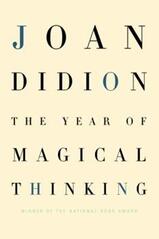 “Life changes in the instant. You sit down to dinner and life as you know it ends.” Such is part of the opening statement in Joan Didion’s acclaimed memoir, The Year of Magical Thinking, in which she chronicles the sudden death of her beloved husband of forty years, John Gregory Dunne. John slumps over at the dinner table in the throes of a heart attack which kills him almost instantly. Didion repeats the above quote throughout the book, mantra-like, as if she’s trying to convince herself of the reality of what’s happened. This memoir is her attempt to make sense of the year following this life-altering event. Didion brilliantly illustrates the experience of grief, beginning when she first arrives home from the hospital after John has “been pronounced”. The hospital social worker tells her the news, hands her John’s belongings, and places her in a cab to go home. She is cool, calm and collected throughout. When she enters her home, her first thought is, “I’m going to have to talk to John about all this.” The fact of his death has not even begun to sink in. “Magical thinking” creeps in; at times, her mind is hijacked by irrational thoughts. She wakes up one morning and wonders why she’s alone in the bed. When she reads John’s obituaries, she has a notion that somehow she’d allowed him to be buried alive. She wants an autopsy done, not for medical research, but so she’ll know for certain he is dead. She resists giving away some of his belongings, especially his shoes, because if he were to return, he’d certainly need his shoes. Grief comes in crushing waves, unexpectedly, in “paroxysms, sudden apprehension that weakens the knees and blinds the eyes and obliterates the dailiness of life.” She experiences “cognitive deficits,” “deranged thinking,” and somatic symptoms such as throat tightening, endless sighing, an empty feeling in her gut. For Didion, grief is prolonged, because their daughter, Quintana, is hospitalized during this period with pneumonia and septic shock. Then shortly after her discharge, Quintana sustains a severe traumatic brain injury from a fall. Didion is simultaneously grieving the death of her husband and “bringing fresh adrenaline to bear on the crisis of the day” with Quintana’s fight for her life and subsequent rehabilitation. Once back at home, several times a day Didion finds herself wanting to discuss what’s on her mind with John. They were inseparable; both were writers and ran everything by each other. She’s tortured by wanting to experience the deeply ingrained habits of sharing each other’s thoughts, and not being able to, but at the same time, she welcomes having the vivid memories of him, the feeling that he is still there. One of her greatest fears in getting through this period is that by moving on with her life, her memories of John will become stale, just a photograph on a table or a name on trust documents. Not quite yet in her rational mind, Didion obsessively reviews and ruminates on the events and decisions that led up to John’s heart attack, and does extensive research into his long-standing heart condition. It’s as if by gathering this information, she’ll “have control”, and might be able to change the outcome. It might open up the possibility that if mistakes in decisions were made, they could be corrected, and maybe John would still be alive. But he is dead. She keeps coming back to this irrefutable fact. She asks herself: will finding any of these answers change anything? No, she finally concludes, if anything, it shows “how open we are to the message that we can avert death… and its punitive correlative, that if death catches us, we have only ourselves to blame.” The back and forth between her irrational hope and the stark realization of John being permanently gone continues throughout the book. Didion brings you right into her mind, her daily experience, while still maintaining her characteristic dispassionate, objective voice and sophisticated use of language. She doesn’t resort to hyperbole or emotionality; her grounded, journalistic tone paradoxically makes the experiences she describes even more powerful. Acceptance, and a return to some semblance of rational thinking, only comes when Didion receives a copy of the autopsy report eleven months after John’s passing. It is only then that she begins to believe that nothing he or she did, or didn’t do, caused or could have prevented his death. At the end of the year, her thinking becomes more rational than “magical”, and we see her experience a few glimmers of moving on with her life. But she still has no resolution, no peace of mind, and has trouble thinking of herself as a widow. Of course, such a huge loss takes a lot of time to recover from, if one can ever do so; “life as you know it” has ended. Every person who has lost a loved one, even a beloved pet, could benefit from reading this book. You’ll see yourself in these pages, which could be a little disturbing, but most likely comforting. Didion’s writing is superb and her voice is consistently unique; in the end you feel like you know her personally. In my opinion, this is the essence of memoir; when a writer accomplishes this, they’ve scored a true win. I wholeheartedly recommend the book.  Lili Alpaugh, a native of New Orleans, lives in Bend, Oregon. She loves the outdoors, writing memoir and essays, studying history, and travel. She is a retired physical therapist and has a passion for helping people with disabilities.
Miss Gorgeous...
Just trying to bestow MY elucidation Comments are closed.
|
Archives
May 2021
Categories |

 RSS Feed
RSS Feed